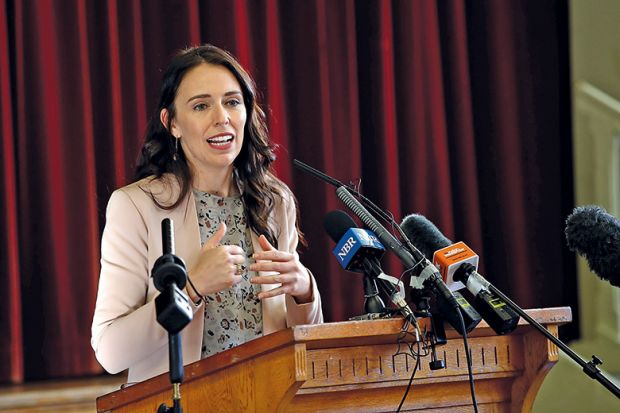Universities and academics in New Zealand have broadly welcomed the government’s commitment to abolish tuition fees, but fear that it will lead to university funding being cut.
Jacinda Ardern, the country’s new prime minister, has confirmed that Labour was “committed” to its free tertiary education policy and would “work quickly” to try to start rolling it out from 2018.
The policy will eventually grant three full years of free postsecondary study to anyone who has not previously enrolled in tertiary education. During Labour’s election campaign, Ms Ardern said that students starting courses in 2018 would receive one year of fee-free study, gradually extended to three years by 2024.
Sector figures told Times Higher Education that for 2018 it was likely that new students would still use the loan scheme to pay their fees, but that these would subsequently be written off by the government. In the longer term, the government would likely transfer money to universities based on their enrolment figures, they said.
Labour’s pre-election costings put the cost of the free tuition policy at NZ$340 million (£178 million) a year.
John Hattie, director of the Melbourne Education Research Institute at the University of Melbourne, said that the policy was “hugely expensive” and that “there is no sign yet [of] what it may do to the university budget”.
“But I imagine, like in Australia, there are few votes affected if the university budgets are slashed,” he said.
Stuart McCutcheon, vice-chancellor of the University of Auckland, said that “it has certainly been our experience that when governments set out to be more generous to students they compensate for that by being less generous to universities”.
Grant Guilford, vice-chancellor of Victoria University of Wellington, said that he was “reasonably confident that there will be a transfer from the state to the universities to replace the loss of fees income”, given that the money has been budgeted for. But he added that it was unclear whether the government would replace the fees “dollar for dollar” or based on the average fee.
Average tuition fees at New Zealand universities are about NZ$6,000 a year, under tiered fee caps that vary across subjects.
Roger Smyth, an independent consultant who recently retired as head of tertiary education policy at New Zealand’s Ministry of Education, said that the government’s costings were based on the assumption that the policy would result in a significant rise in university participation, which he said was “unlikely”.
“This means that the costings are incorrect – the policy will end up costing less than they have assumed,” he said.
Chris Whelan, executive director of Universities New Zealand, added that, prior to the election, “the policy was announced with costings that indicated that higher education providers would be fully compensated for the reduction in fees”.
“As long as that happens, the policy will work,” he said.
The new government has also brought tertiary education under the responsibility of its new minister for education, Chris Hipkins; previously education and tertiary education were separate portfolios under different ministers. Research, science and technology is now a separate ministry.
Professor Guilford said that the previous system was a “very good model”, as it highlighted that universities are “not just teaching institutions, we are research-led teaching institutions”, and that the change will make it “slightly more difficult” for universities.




